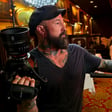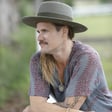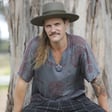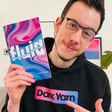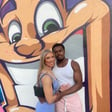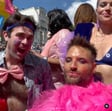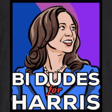Become a Creator today!Start creating today - Share your story with the world!
Start for free
00:00:00
00:00:01

"Bad" Bisexuals with Jacob Engelberg
Follow Jacob Engelberg on Twitter at: @criticalprvrsn
Two Bi Guys is created and hosted by Alex Boyd and Rob Cohen
Logo art by Kaitlin Weinman
Music by Ross Mintzer
Season 2 is executive produced by Rob Cohen and produced by Alex Boyd and Moxie Peng, with support from IFP
Transcript
Introduction to the Season and Guest
00:00:12
Speaker
Hello and welcome to Bye Guys. I am Rob here solo today and we've got a very interesting episode for you. Some of our guests this season have run the gamut from professional football players to genderfluid fetish content creators
00:00:29
Speaker
And today we have something different, a PhD candidate at King's College in London. He is researching bisexual transgression in film, a topic close to my heart. Please welcome Jacob Engelberg to Dubai Guys. Hi, Jacob. Thank you so much, Rob, for having me. It's such a pleasure to be here.
00:00:49
Speaker
It's nice to finally meet
Connecting through Twitter and Bisexual Representation
00:00:50
Speaker
you. I forget exactly when I started following you on Twitter, but that is sort of how we got in touch. And I just remember really being drawn to the stuff you were tweeting and some of the articles you were writing. So I'm very interested to get into this next level of bi-representation and what all this stuff means.
00:01:12
Speaker
No, I'm really happy to hear that, and I feel like I'm much less exciting than some of the other guests that you mentioned, but I'll try my hardest to be. No, no, this is the important stuff because I think on bi Twitter, which is like a big thing, and bi Twitter is like a much bigger portion of Twitter than bisexuality is in real life, I think.
00:01:33
Speaker
And, you know, something I've noticed being on by Twitter for the last couple years is we end up going in circles sometimes and talking about a lot of the same things. And like, it's on the one hand necessary because there's so many myths and misperceptions. But on the other hand, it's like I'm getting tired of dispelling myths and stereotypes and I'm getting tired of the idea that we have to do that, which you've written about.
00:01:59
Speaker
So before we get into your research, why don't we start with what are your pronouns, how do you identify, and why do you use whatever labels or words you use?
Jacob's Identity and Early Awareness of Bisexuality
00:02:11
Speaker
So my pronouns are he him, and I identify as a bisexual, queer, Jewish, radical leftist guy. And yeah, I suppose
00:02:27
Speaker
To focus on the buy one, I think I remember hearing the word as a kid and thinking that that was like, oh, there's finally a word for that thing that I've been feeling. And even though I didn't come out until much later, it always stuck with me that there was something there that resonated with me.
00:02:46
Speaker
And as I got older, I got more interested in bisexual history and bisexual politics, which is quite difficult to come across unless you go searching for it sometimes. And then it felt like I was part of this kind of legacy that I'm very proud to be part of.
00:03:06
Speaker
Interesting. I mean, I love relating the Jewishness and like radical leftism to this because I also identify as both of those and I never quite made that connection to bisexuality until later in life. So we can talk about that in a bit, but when you say you had those some thoughts as a kid, but then you came out later, when actually was that? How old were you when you had those first thoughts and what led to
00:03:35
Speaker
whenever you did come out and when was that? I mean, I remember being a very sexually curious kid. From a very early age, I wanted to know what this sex thing was and what all the adults did and all the jokes that they were having and whatnot.
Coming Out and Supportive Environments
00:03:57
Speaker
And
00:03:57
Speaker
Yeah I remember I would like set the VHS player in my family home to like record late at night just in case there was something like sexy on and then I'd get up really early in the morning to like watch it in private. This is like the age of like five or six or something and I could have really been scarred by that but luckily I wasn't.
00:04:22
Speaker
But yeah, and I didn't actually come out till I was 19, which it felt like that was late at the time because I did have an awareness of my sexuality all before then. But I think the important thing for me was to come out in an environment where I would feel
00:04:43
Speaker
safe, and an environment where I'd feel believed as well, which I think is a quite an important thing for bisexual men is that you don't want a coming out experience where people say, ah, he's, he's just gay, and he's gonna get there. So I had to be kind of sure that I was in a social environment where I didn't think that was going to happen. And that wasn't really until the age of 19. It's funny how like,
00:05:10
Speaker
pretty much everyone thinks they came out late, no matter what it is. Because like, there's always that period where you kind of know something, but we're not ready. You know, I had that, but it was at age 30. Right. That felt really late to me. And but then I've met people who came out in their 50s or 60s and like,
00:05:29
Speaker
There are so many myths and misperceptions that you kind of want to take the time to understand it yourself fully so that you can be confident and not get pulled in another direction when you come out almost. Yeah, absolutely. Absolutely.
00:05:45
Speaker
So I was going to save this for later, but let's get into it now. I also identify with what you're saying, being curious sexually. I didn't think of myself that way at the time, but looking back, I did. And your story reminds me that I once
00:06:00
Speaker
like found these videos in our basement they were like erotic massage videos like that my dad and like hid in the basement and i was just randomly searching for something one time and found them and i i never told them that i found them i mean if they listen to this episode it'll be the first time that my parents know that i that i saw those but i would like watch them late at night after everyone went to bed just to see like what it was and what my parents were
00:06:30
Speaker
Like, I didn't look at them as sexual beings. They're like parents.
Bisexuality and Radical Politics
00:06:36
Speaker
And I think there's something, maybe you can help me sort this out, that's related to bisexuality, related to not just liking people of multiple genders, but wanting to expose sexuality in a different way and to break through the
00:06:52
Speaker
sort of puritanical cultures we live in or mono sexuality or monogamy. They're just like anti-normative and putting things out in the open. Does that make sense? And is it related to your lefty politics? Like it's a big question. I don't know where I'm going.
00:07:10
Speaker
Absolutely, no. I think that bisexuality for all of modern history has been something that has been forbidden and has never been really able to be assimilated into a norm in the ways that we can see perhaps some forms of homosexuality.
00:07:33
Speaker
So I think it's always had this this kind of status There is this outsider status and I think from there you can begin to kind of think critically about Sexuality as a whole and be and I think that experience of being being curious about sex and sexuality I do think that there's something quite by about that but in terms of yeah the links to kind of radical politics and and stuff some of the
00:08:03
Speaker
Interesting stuff that I came across recently is I was doing research into male bisexuality and European cinema, art cinema of the 20th century, and I came across some kind of political activist figures. The first one is a guy called Mario Miele, who's an Italian activist, and the second one is a guy called Daniel Guerin, who's a French activist.
00:08:30
Speaker
And both of them advocated for something that we would now think of as bisexuality. Garand called it that. Miele didn't. And they saw that there was, they saw in bisexuality a kind of
00:08:46
Speaker
a promise of a radically different future. And I mean, they're quite kind of extreme thinkers, in some senses, because Geiran would write about gay men as being misogynistic in the way that they're put off by women. But I think that there's something there in those slightly kind of utopian kind of political projects.
00:09:12
Speaker
to think about what does it mean for our desires to inform our politics and for our politics to inform our desires, which I think are really interesting questions.
Bisexuality and Alternative Societal Visions
00:09:22
Speaker
And I think sometimes it's a reminder that we need to look away from Anglophone histories of sexuality to see how these things have been conceptualised elsewhere.
00:09:33
Speaker
Yeah, it's interesting. It does, there is some does seem to be a connection for me of like, with my bisexuality, never really quite fitting into the way I saw the world. But then when I started understanding myself and coming out realizing, oh, the world actually could be very different. And we could make that world. It's similar to like, democratic socialism or like, you know, radical progressivism of like,
00:10:01
Speaker
not making little incremental changes within the way things are, but actually imagining whole new systems. And the resistance you get to that feels similar in a way. It's almost this like, well, that's impossible kind of reactions that I've had to both progressive politics and bisexuality.
00:10:23
Speaker
No, I love that. I love that. And I think that there's, yeah, there's a lot to be drawn from those analogies, actually, about the importance of thinking the impossible. And to be imaginative in the way that we think about the world as well, the utopian politics is a way of, of moving the world towards something that is radically better. And I think that
00:10:49
Speaker
I think our bisexuality can inform that by knowing the possibility of something that is not dominant right now can happen. Yeah. Yeah. Reminds me a lot of Shiri Eisner's book, Notes on a Bisexual Revolution, if you have not read that one. Oh. I'm sure you've read it. Oh, sorry. I mean, I mean- The U.S. Embassy.
00:11:12
Speaker
Yep. I know you've read it because I think you mentioned it. Yeah, yeah. Some of your writing. So let's get into some of your work. Yeah. Although before we get into the actual content of it, like.
00:11:22
Speaker
How did you get interested in doing this as PhD research, as like, you know, your professional studies? So I studied film and literature during my undergrad and I kind of encountered queer studies for the first time and like lots of other queer people. It was a really inspiring moment for me, discovering queer studies and having people put
00:11:51
Speaker
theories together that spoke to something that I had only ever felt, or whatever. There was a lot there that really nourished me. But at the same time, as a bisexual person doing that, I was looking there for a kind of
00:12:12
Speaker
account for the specificity of bisexuality that I didn't really find in queer studies, and it's still not discussed much in queer studies, if at all. We only really see it talked about in terms of psychoanalysis, in terms of innate bisexuality, and that is in a very kind of historically contingent way. Or we see it discussed as a kind of
00:12:38
Speaker
identity and its status as an identity is kind of seen as unique to bisexuality as if homosexuality isn't also a form of identity. But it wasn't until my MA, which was
00:12:55
Speaker
a degree that was called sexual dissidents, that I began to engage with those things that I was talking about, bisexual history, bisexual activism, and also learning about bisexual theory, which was a thing that came about in the aftermath of queer studies as a direct response to it that really challenged the way the monosexuality got naturalised within queer studies.
00:13:22
Speaker
So none of these things have ever become dominant in these fields or become institutionalised in the same way as queer studies has and trans studies is beginning to as well, but I think that there's so much to take from these ideas. So during my MA I wrote about the films of Gregor Rocky. My PhD came about
00:13:48
Speaker
A few years later, I worked outside of academia for a while. And then I came back because I felt like I wasn't done exploring this stuff. And I think I've always found bisexual baddies, bisexual villains, incredibly compelling.
Bisexual Villains and Their Complexity
00:14:09
Speaker
And I wanted to engage with them in a way that was looking beyond the kind of
00:14:17
Speaker
discussions that I was seeing around me on social media and in certain publications of this character does a bad thing and they're bisexual and that that means that it's bad for bisexuals. I didn't quite buy that and so I wanted to look into that in a bit more detail.
00:14:44
Speaker
I actually had never seen Basic Instinct until this week. I watched it in preparation for this, and I watched it with some of the stuff you've been writing in mind, and I loved it because I just enjoyed what it was, and I let go of that.
00:15:01
Speaker
idea that you're talking about that a bad person who is bisexual on screen is bad by representation. So let's get into that. I mean, in real life, bisexual people, to be good representatives of our identity, we just kind of have to be and exist and be out if possible and be open and honest. However, when you're talking about film or TV,
00:15:26
Speaker
bisexuality has this sort of need to be witnessed or proven within the film or show itself. And that often just gets reduced to the character being with a man and a woman within the course of the film or TV. So how do you talk about representing bisexuality differently when it's in real life versus in fiction? Or what's wrong with that conception of bi-representation in film? How is that limiting?
00:15:55
Speaker
Yeah, so I think sometimes people borrow that kind of real life idea of bi-representation and I think it's a really useful idea in terms of politics to think about queer organisations, LGBT organisations, and to what extent is bisexuality a concern for them, to what extent are bisexuals represented in their organisation and things like that, I think it's very useful.
00:16:23
Speaker
I think that the issue that we get when we kind of move that to film and TV is that sexuality is only kind of readable on film in very specific ways. And the dominant way of reading sexuality in film is kind of biased, let's say, towards monosexuality.
00:16:45
Speaker
And that if we see a single image, I like to give the example of two people kissing, dependent on their gender. The kind of dominant interpretive model is to say, two men, it's gay, man and woman, it's straight, woman and woman, it's lesbian. And that is the kind of model of interpretation that we're having to contend with when we approach bisexuality in film.
00:17:11
Speaker
there are actually very few instances within that framework that bisexuality can ever be readable on film. And even in those kind of examples that you give where characters have relationships with people of different genders, it can still be interpreted in a monosexual way. There's a great scholar called Beth Carroll Roberts that says that those narratives can tend to be interpreted as
00:17:39
Speaker
either coming out or going straight narratives depending on the ordering of the partners. And so if we take an example like Brokeback Mountain, people were able to read that as the gay cowboy film because they kind of constructed the same gender relationship as one of
00:18:00
Speaker
freedom and authenticity and constructed the relationship those men had with their wives as one of inauthenticity. Now that's not something that the film necessarily tells us. The film actually shows us some really hot passionate sex between those men and their wives actually, but still that interpretation was made.
00:18:24
Speaker
So I think we need to start from that idea that it's very difficult to have an image that is undeniably bisexual, but I think we can learn something from that, that our experience of reading sexuality on film is very much informed by the way that we approach it and that these images don't always have inherent meaning in them.
00:18:49
Speaker
So in terms of how I approach that, given there are those problems and that you can't always say that something is definitive bisexual representation or not,
00:19:00
Speaker
I am interested in the instances in film where monosexuality kind of fails, where monosexuality kind of gets undermined in a moment, and I look to those moments to
Monosexuality vs. Bisexual Potential in Film
00:19:15
Speaker
think what's going on here where a bisexual possibility kind of enters the fold. That's my way of kind of avoiding
00:19:24
Speaker
what would be quite a boring project of saying, no, all these films are actually bi and they're not actually gay, but thinking instead about what, if we kind of attune ourselves to thinking about how bisexuality might emerge in certain ways, what might we discover there?
00:19:41
Speaker
I loved that, and I loved reading that part in your work about how depending on the order of events, it can be interpreted through this monosexual lens. And I look back and I think to myself, well, I never connected with those coming out narratives. They didn't quite feel like me. And I think in my head at the time, Brokeback was that. I interpreted it through that lens.
00:20:02
Speaker
And a recent example of when my brain was a little bit more attuned to this stuff was call me by your name. I connected with it so much and I just I saw him as by the whole both of them as
00:20:18
Speaker
by but even sort of regardless of the label I just connected with those experiences in whatever order and just it felt so true and real whatever moment we were seeing but even that one was interpreted by many critics as a gay coming out story, a gay coming of age story. No absolutely and I think that
00:20:43
Speaker
I had a very similar experience watching it that I was so kind of overjoyed that in a film that was so that centred around this queer love story and that was being marketed around that, that we got such kind of meaningful scenes of the relationships between Elio and the girlfriend that he has. Yeah.
00:21:10
Speaker
and to have that so kind of front and centre felt very special to me. And it's interesting that there are some gay critics that saw that as homophobic almost, that it kind of like undermined the gay love story in that. I'm actually writing a chapter for a collection on Call Me By Your Name next year, so I'll be able to flesh these ideas out a little bit more.
00:21:43
Speaker
So anyway, moving on, let's maybe start with this idea of seeing bisexual possibilities that are outside of a character being with a man and a woman. And I would love for you to start with an example that you wrote about that I thought was so interesting. How do you pronounce it? Salo? The movie Salo. Yeah. The movie Salo and the genderless asses in Salo. Can you tell us what that's about?
00:22:09
Speaker
Yeah, so Salo is a very interesting film. It kind of has a reputation for being like one of the most shocking films or disturbing films ever made. And it's by a director called Pier Paolo Pasolini. It was made in 1975. It's his final film. He was murdered shortly after, actually.
00:22:35
Speaker
Oh god. And yeah, I mean that's a whole story in and of itself. I think the most likely theory is that he got killed by a rent boy, but we don't know why. Well you know these murder podcasts are much more popular than ours. Maybe we should do like a bisexual murder. Oh my lord. I'll save that for the next iteration of this pack.
00:23:00
Speaker
I'm actually really interested in bisexual serial killers and how they're talked about in the media, but that's something else. It would be a hit. I'm sure. New new podcast idea. Let's talk tomorrow. Okay. But yeah, I take I take so the story of Solo is it's adapted from a book by the Marquis de Sade in which a bunch of Libertines abduct a group of teenagers and torture them in horrific
00:23:29
Speaker
ways and and it's all very sexual as well and Pasolini takes this story but applies it to fascist Italy in the kind of final years or I think it's implied that it's like the final days of Italian fascism and
00:23:49
Speaker
The film is interesting in as much as it's a really interesting exploration of fascism but also fascist erotics and what it does is it kind of really uncomfortably puts you in the position of the fascist or the abuser and then if we perhaps feel aroused at the things that we see or
00:24:14
Speaker
Some of the scenes are really quite sexy, then there's this ethical dilemma that we have, basically. And so I use an example from the film in which a kind of competition is set up by the Libertines to ascertain which of their captives has the best arse.
00:24:35
Speaker
and the way that they do it is they position them all on the floor with their heads down and their arse up in the air and one of the Libertines comments that this kind of layout is the best because if we don't know what gender they are then we can be truly impartial and I just found it such a kind of
00:25:00
Speaker
fascinating moment where a kind of very significant kind of social transgression of this horrible kind of torturous, abusive environment and these kind of depraved Libertines games is aligned with a kind of bisexual erotics of wanting to have a kind of desirous setup where we are looking beyond gender.
00:25:30
Speaker
Yeah. I like the phrase you used, fascist erotics, which I have never heard that phrase before. I'm not sure how much I want to dig into that phrase, but you also in your writing describe eroticism as like a violation of rules, that that sort of is what makes something erotic sometimes, I guess. And
00:25:54
Speaker
I want to read something you wrote that I thought was a very interesting line. You wrote, I suggest we can observe a cultural menage à trois between transgression, eroticism, and bisexuality. And your dissertation is about bisexual transgression in cinema and that there's a connection between those kind of film transgressions and the
00:26:18
Speaker
the societal transgression of bisexuality. I don't know what my question is, but I guess, how does this play out? No, absolutely. What's going on? I think I began to notice that for these kind of bisexual moments to happen on film, they're often achieved through a kind of breaking of a rule or a surprise of our expectations.
00:26:46
Speaker
that is in and of itself transgressive. And in that moment, we kind of get an illumination of the kind of structures that keep those rules in place. And through them, we get to see how kind of fragile monosexuality is.
00:27:07
Speaker
And yeah, and there's something about transgression also that it's an alluring thing, that transgression is a space where rule-breaking is actually quite hot. It doesn't necessarily need to be morally acceptable for it to be thrilling. Often the opposite can be true, that the fact that you shouldn't be being
00:27:30
Speaker
turned on by Sharon Stone being like a murderer who's like kissing men and women simultaneously in toilet cubicles kind of makes it more hot. Yeah, it was either the first or second episode of this podcast.
00:27:46
Speaker
said something like to me bisexuality is about saying fuck the rules like all of the room not just the like Gender rules but like a bigger than that of like monogamy and hetero Patriarchy and and like looking back that's sort of something that's defined my life as
00:28:06
Speaker
in a way. Like I, to me, my Judaism feels like it's very much about questioning everything. That's what I learned in Temple was like asking questions and that's what Torah study is, is questioning everything. And I remember when I was
00:28:21
Speaker
Actually, I don't remember, but my mother tells the story that when I was like four or five years old, she wouldn't let me watch TV or something. I was breaking some rule and I stood up on the couch and I said, I make the rules, not you. And so it's like this push against the rules and the way
00:28:41
Speaker
the way things are. Yeah, and I think that there will be kind of rule-breakings that we find kind of enjoyable and fun and politically radical. Then there'll be rule-breakings that we find uncomfortable and that make us uneasy. And I think that that can be often what makes by activists or by people critical of these kind of bad bisexual characters because they see
00:29:11
Speaker
a bisexual murderer or rapist or whatever and think there's no way of me relating to this other than the literal horror that I'm having right now at seeing this. But for me the important thing about
00:29:28
Speaker
film and literature and all these things is that it's not real life and that we can interpret those things metaphorically and we don't need to engage with them as if they are saying this is what bisexual people really are.
00:29:43
Speaker
And I think that in those kind of more heinous representations that might make us more uncomfortable, we actually get a sense about what society fears about bisexuality, which I think is so incredibly powerful for us to look at. And in that sense, I'm really inspired by Shiri Eisner when she talks about not wanting to do myth busting or denying stereotypes.
00:30:13
Speaker
She says the things that are the most troubling for monosexual society about bisexuality are the things that make it most subversive and we can lay claim to those in a subversive fashion.
00:30:26
Speaker
I agree, and I know, though, that I have fallen into the trap, too, of wanting good bi representation. And often, especially on Twitter, this gets reduced to the bisexual character should be a good person and should not play into these stereotypes and should
00:30:45
Speaker
be a myth buster. And that ends up being so limiting in terms of what you can do creatively. And as you're saying, it implies that the way that a bisexual acts on screen is representative of the way bisexual people are. So how do you think we should be as queer people viewing these kind of narratives? I think it's a very kind of natural response. Growing up,
00:31:15
Speaker
queer and for many of us seeing a kind of dearth of people with desires that look like ours on screen. I think it's a very normal thing to want to go, oh we need more of this and we need better of this, but I think
00:31:30
Speaker
Yeah, when we get into the nitty-gritty of those things that you just mentioned, of what counts as good representation, should we just assume that people believe everything about a certain sexuality because they see it on screen, like treating cinema as if it was this kind of didactic propaganda tool where we learn what sexualities are really like?
00:31:53
Speaker
So I think the first thing to kind of come to terms with is that there's no way for any sexuality to be fully represented on screen. We're only ever getting iterations of sexuality that are never going to be
00:32:11
Speaker
they can never be accurate, they can never be complete. So I think we need to look both at the content of films, but also at the ways in which we watch films. So in terms of the content, there's some really interesting discussion to be had around when and how bisexuality makes itself known. How does this relate to the context in which the film was made? And then in terms of how we watch film,
00:32:39
Speaker
I think we can take meaning pretty much where we want it. If something feels meaningful to us as a bisexual, that can be enough. That can be enough that you feel a sense of sexual tension between these characters. It doesn't need to be shown. It doesn't need to be voiced. It doesn't need to be proven. There can be something there that we enjoy. And that's the... I mean, without sounding too pretentious, that's the beauty of art.
00:33:08
Speaker
is that we can interpret these things and they can be meaningful for us in different ways. Yeah, it's always looking at movies and film that way from how it speaks to you and what you see in it is almost a queer way of looking at film.
00:33:25
Speaker
Absolutely. And it's a queer tradition. I mean, this is why queers tend to love classical Hollywood because we love to read between the lines and find in Marlene Dietrich and yeah, oh god, I'm forgetting people, Marlon Brando or whatever, to find these moments
Diverse Bisexual Representation in Media
00:33:47
Speaker
where we're like, oh, yes, that moment.
00:33:51
Speaker
Well, and working on Law and Order SVU, I literally watched that kind of stuff happen in real time because there would be stuff in an episode and our fans would notice these beats, these little looks or these little moments that they saw queerness in. And like most of the time it was not the intention, but you know, even if something is not intentionally queer,
00:34:20
Speaker
if people read that from it, it is. Right. I also think it's not that those clear, quote, good representations of a bi person shouldn't exist because, you know, in fact, when I heard Rosa Diaz on Brooklyn Nine-Nine say I'm bisexual, I cried because I realized it was the first time I had heard that out loud and it spoke to me. And had I seen a representation like that when I was younger,
00:34:49
Speaker
maybe it would have broken me out of my binary way of thinking sooner. And that kind of stuff has been sort of hidden. However, stuff like that is great, but it can't be the only way that we portray bisexuality on screen. And it can't be the only kind of representation that we're searching for. And it's like,
00:35:11
Speaker
basic instinct, the by angle of it adds this like tension and questioning that there's something by about that idea in addition to just she kisses a man and a woman. Absolutely. But I also think in that film, you get this idea of her being kind of unable to pin down an inscrutable in ways that I think really mirror how bisexuals
00:35:38
Speaker
are conceptualized in wider society and for some reason it makes a lot of, for that reason it makes a lot of sense that we get this kind of erotic thriller detective narrative going on because this whole, our whole kind of regime of sexual knowledge that we have is always quite troubled by the presence of bisexuality. Right, it's like what you mentioned earlier and what you've written about which is like
00:36:04
Speaker
the bi representation isn't just about the bi person on screen, it's about the reactions of those around that person. And in a way, when the bi character is a bad person or plays into stereotypes, it reveals the ways in which the society a large around us actually does react to bisexuality. And so in that way, it's almost
00:36:27
Speaker
good, accurate representation of the challenges we face. Right. I mean, if we're going to call anything accurate, it kind of accurately gives us a sense of the social anxieties that exist in society. And that's something that I've definitely been inspired by Shiri Eisner's work, is that we get a sense of what society is anxious about. It's anxious about
00:36:55
Speaker
There's, I just read a really great book called, it's called The Bisexual Mirror. It's written in French and it hasn't been translated but the author Catherine Deschamps writes about
00:37:11
Speaker
the kind of assumption that all bisexuals are non-monogamous is rooted in people's fear about not being fulfilled by monogamy. And I just really like that as a kind of idea that it can be a kind of transference of society's fears about itself onto the figure of the bisexual.
00:37:39
Speaker
Another thing we've been trying to talk more about on the podcast is gender fluidity and how that relates to sexual fluidity. And you wrote about how in film also, as gender becomes more fluid, so does sexuality. So what are some of these narratives you've seen or how do we look at those as, should we look at those as bisexual? Are they just kind of queer?
00:38:02
Speaker
No, I think that when we have narratives of gender transition, the potential is opened to think beyond binary ways of thinking about gender. And often in those processes, in narratives where that person has relationships with people,
00:38:23
Speaker
The idea that one is either gay or straight is also opened up. So I think that there's something that's quite special and meaningful about trans narratives as opening up the possibilities of sexuality as they open up.
00:38:40
Speaker
different possibilities in gender for sure. And I think that bi and trans kind of activism has historically kind of gone hand in hand, but I think in terms of the way that we approach media critically, I think that many more connections can kind of be forged there.
00:38:59
Speaker
Yeah, it's also interesting, another thing you wrote about that's kind of similar, although it doesn't even have to take place within a narrative, which is this idea of movie stars that we want to be with them and we also want to be them.
00:39:14
Speaker
Or in a movie, like, you know, we want to take their place and be fucking who they're fucking, but we also kind of—there's a magnetism to that person itself, and there's something almost inherently by about that.
00:39:30
Speaker
Yeah, and this is the really ironic thing about film that given all the discussion we've had about how difficult it is to kind of represent bisexuality definitively and whatnot, there's this really bisexual process that goes on in spectatorship. And bisexuality was actually a really key term for feminist film theory in the 70s and 80s.
00:39:56
Speaker
when they were thinking through this ability of spectators to both desire anyone that they see on screen and to identify with anyone that they see on screen and the desire aspect they characterised as bisexual and the identification aspect of it they characterised it as transsexual or transvestism in the language of the time and it's interesting how those both get kind of taken up
00:40:24
Speaker
in ways that don't really relate to them as identities but more as metaphors, but to describe that process of spectatorship. So there's definitely an argument to be made that there's something very bi and very trans about watching a film anyway that I can be a cis guy and watch like a Cheryl Dungye film or a Barbara Hammer film and I
00:40:51
Speaker
and kind of inhabit that position of the lesbian woman for that 90 minutes, there's something really interesting going on there around gender and sexuality that we can inhabit these different spaces that we can play around with our desires in a safe kind of way. So I love that idea that there's always been something by about watching film.
00:41:17
Speaker
Well, and I also now want to relate this to porn because I see a parallel there too, which, and you've written about porn. And porn was basically one of the things that awakened me to my bisexuality. And I remember, you know, at first I would watch like a man and a woman doing something and I'm imagining that I'm the guy. I'm identifying with him, wanting to be him in that situation. But
00:41:44
Speaker
Over time, at some point, I think I sort of realized there's something about this whole thing that's kind of hot to me. And it's not just I'm blocking out his body parts and putting myself in his brain and focusing on the woman.
00:42:00
Speaker
the whole thing is erotic or arousing. And like, there's this idea that by porn, like by film, you have to see the person be with a man and a woman. There's this idea that by porn, and if you search for by porn even today, what you get is a threesome, usually two men and a woman. And yet, kind of based on what you're saying and my experience is like,
00:42:24
Speaker
If you're watching a man and a woman on screen in porn, you as the viewer are, whatever gender you are, isn't it bisexual by default almost? It's a very bisexual experience. It's a very bisexual experience watching porn and I think that, yeah, all those things around spectatorship and desire and identification are so heightened when it comes to porn film because we literally get to
00:42:52
Speaker
desire and identify to get off to it. Yeah, and it's a really interesting thing. Early kind of porn studies work, there's some writing where people are a bit flummoxed by the idea that straight men will look at other men's bodies.
00:43:12
Speaker
and like trying to grapple with this. And that there is something kind of inherently bi about it and that isn't to kind of make a claim for everyone who watches, for whatever being really bi, but it does contain these kind of potentials within it.
00:43:30
Speaker
And as you were saying, there's potential for us to play out things in our desires to kind of identify with being a woman in a straight porn scene. We've kind of touched on this, but a lot of your work is kind of about how we should be viewing films and other representations of bisexuality and other art.
00:43:52
Speaker
forms, but you know like I am a content creator. I'm working on a pilot about male bisexuality. Like what advice would you have for someone like me or anyone out there creating films or other art about this stuff? Like is there a direction you would like to see things go? Oh, that's such an interesting one.
00:44:15
Speaker
I think the first thing that I would say, which is something that you probably already know, that whatever you intend something to be doesn't mean that people are going to take it that way. And that's going to be something that you have to live with as a content creator, that even if your intention is to kind of do something or make some kind of intervention, it might not be seen like that.
00:44:36
Speaker
What would I say? I would say that in my most recent chapter I looked at a film called Savage Nights by a French director called Cyril Collard, who was a bisexual man who made a film that was semi-autobiographical about his life.
00:44:57
Speaker
He was HIV positive and he lived a very kind of promiscuous lifestyle and he represented that in his film with kind of a very raw honesty that made the film particularly popular in France.
00:45:16
Speaker
I think if that film were to be released today, I can imagine that people would say, oh, it's confirming stereotypes about bi people, it's presenting us as risky and promiscuous and disease spreaders and whatnot.
00:45:34
Speaker
But I think what he did was he chose to kind of inhabit those things and his complex relationship to them and stay with that complexity. So I think part of my advice would be not to be afraid of the bi-stereotypes that you might adhere to and that you might want to explore and that there's something
00:45:57
Speaker
to be gained in just kind of sitting with them for a bit and staying with them and exploring that. And that that's kind of where interesting learning happens, I think.
00:46:08
Speaker
Yeah, I mean, I've found it's almost impossible to get away from them entirely anyway, even if I try, because my experience has been at least somewhat defined by those stereotypes or the reactions to them. So to get an authentic experience, it can't be this perfect world.
00:46:31
Speaker
Absolutely not, absolutely not and that authenticity will be authentic to you and that will be the important thing as a content creator and you'll get people saying this isn't my experience of bisexuality and I'm not like this and I don't go to sex parties or whatever but that's on them.
00:46:56
Speaker
So I want to talk about one last thing that isn't exactly the focus of your research, but you did publish an article and kind of jumped into the fray on this issue. So this was big, big news a couple of months ago. Scientists once again proved the existence of bisexual men. I believe it was a
00:47:19
Speaker
meta-analysis study of other studies that looked at physiological responses to erotic stimuli, to porn of men and
Critique of Outdated Scientific Studies on Bisexuality
00:47:31
Speaker
women. And they thankfully determined that bi-men are real. I guess like the worst case scenario would be the opposite. But at the same time, the existence of this study and the way that they looked at this
00:47:44
Speaker
is not only, in your opinion and my opinion, pointless, but also possibly harmful. Yeah, so the thing about these, I think we need to look first at the kind of test that this is. So it was developed by a Czechoslovakian sexologist called Kurt Freund, who
00:48:06
Speaker
developed this test which is basically a gauge that you put around someone's dick and then show them erotic material and you see how aroused they get and he used that as a way of determining sexual arousal and he used that to... I believe it was like testing whether guys that had said that they were gay so they didn't have to serve in the army
00:48:32
Speaker
because you weren't allowed to be gay in the army, they were tested to see whether they were actually gay. That was one of the first uses of it. Since then it's been used a lot to try and determine how cured paedophiles are, but the most worrying version of this for me was that it was used in the Czech Republic in asylum cases where people were seeking asylum on the basis of their sexuality.
00:49:01
Speaker
this test was used. So it has this kind of messy history that is rendered even more kind of troublesome by the test itself. I think that to get an erection in a kind of essentially a lab setting isn't what like everyone can do.
00:49:24
Speaker
certain kinds of porn arouse people certain kinds of porn don't arouse people and then there's the question of the erection being this kind of gauge for for arousal when I mean I write this elsewhere that anyone who's like bottomed or done BDSM in their life knows how fucking turned on you can be while having a flatter dick so
00:49:47
Speaker
It's this very kind of cold scientific idea of what it means to have a sexuality. It's this kind of measurable thing, and if the penis grows by x millimeters, then that means the sufficient arousal has taken place. So there are all kinds of problems with this.
00:50:11
Speaker
But the way that it had been used around male bisexuality had predominantly been to prove that it didn't exist. One of the guys that was involved in this recent study, a guy called J. Michael Bailey, known most famously for being quite a transphobic person who wrote a book about trans women that is just awful. But anyway, he did some of these
00:50:34
Speaker
earlier tests which he said confirmed that physiologically speaking he can't find evidence for the existence of male bisexuality. Now he did tests later which suddenly did and it's not some like scientific breakthrough, it just goes to show that it's a really shitty way to conduct research and it is based in this kind of belief that the
00:51:04
Speaker
that the body is this kind of neutral site where we can take measurements like as if it were a kind of soil sample or something to like see the percentage of things. It's such a rigid and unimaginative way to conceive of sexuality.
00:51:24
Speaker
So I think that even when we have these reports that say male bisexuality does exist, definitely we found these guys that get hard when they're shown naked women and naked men. That's not an opportunity to say to say hooray because we really need to dispute that mode of understanding what sexuality is. It's something that Quiz Studies has fought against for the past 30 years and Quiz Studies really went
00:51:53
Speaker
to town on medicine and the medical sciences and the way that they essentially sought to prove things that were just confirming their own prejudices. Ultimately it has
00:52:11
Speaker
no claim to legitimacy. I feel quite passionately about this. I couldn't agree more. And it's like, you know, I think I did think that way when I was identifying a straight. If I'm hard, then I like this. And if I'm not, then not. And that caused a lot of, first of all, it caused me a lot of
00:52:32
Speaker
concern at certain points because with some women I got hard and with some women I didn't and that made me question my sexuality every time instead of what I now realize which is like there are so many things around a sexual experience that determine what happens at each moment and how aroused you are and and it's not just about the gender of the person we can't reduce it all down to that
00:53:00
Speaker
And like there have been times I'm at a sex party and I'm very turned on and there's a bunch of people around of different genders, but I'm not hard until I start playing with somebody. Like it's just very reductive. Absolutely. But the thing is you get a sense that the people doing these kind of experiments have no knowledge of that.
00:53:21
Speaker
they really are set in that kind of patriarchal, straight framework and I can definitely relate to that. The idea that sex is penetration and it's about a hard dick and actually one of the great things about Quinnus is we get to experience so much beyond that and
00:53:43
Speaker
And part of why I like having relationships with queer women actually is because I think queer women don't, in general in comparison to straight women that I've been with, don't come to sex with those kind of expectations either. That there is the idea that there's no such thing as foreplay. It's just all of it is sex and we're having a good time.
00:54:09
Speaker
Exactly. No, we've talked here about how, for me, sex with women got better after coming out as bi and queer and exploring my queerness because of exactly what you're talking about. It didn't just open up the doors of gender of my partner. It opened doors of so many things of sex not being this rigid thing, but actually
00:54:32
Speaker
There's so many different types of activities that are related and part of a sexual experience. Absolutely. Absolutely. And I think that, yeah, studies like this will never understand that. And it's actually beyond their understanding because they want things that you can put in a data set and do stuff to.
00:54:56
Speaker
And that's why we need the humanities to be discussing this stuff, really. That we sometimes need to go, I love the sciences and they do some excellent stuff, but actually this stuff, you're not needed here. Yeah, we don't need you here.
00:55:17
Speaker
All right, great. That's a perfect place to stop. Thank you so much for being here on Two Bye Guys, Jacob. It was nice to finally meet you and I look forward to the dissertation being published and whatever else you continue tweeting about. Thank you very much. Fingers crossed they'll get a book out of me one day. Great, thanks again. Thank you so much, Robert.
00:55:42
Speaker
Two Bye Guys is created and hosted by Alex Boyan and me, Rob Cohen. Our logo art was designed by Caitlin Weinman, and our music was composed and created by Ross Mintzer. Season 2 is executive produced and edited by me, Rob Cohen, and produced by Alex Boyan and Moxie Pung, with support from IFP. Thanks for listening to Two Bye Guys.




